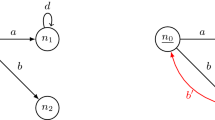Abstract
This paper presents a novel algorithm to detect null pointer dereference errors. The algorithm utilizes both of the must and may alias information in a compact way to improve the precision of the detection. Using may alias information obtained by a fast flow- and context- insensitive analysis algorithm, we compute the must alias generated by the assignment statements and the must alias information is also used to improve the precision of the may alias. We can strong update more expressions using the must alias information, which will reduce the false positives of the detection for null pointer dereference. We have implemented our algorithm in the SUIF2 compiler infrastructure and the experiments results are as expected.
This work is supported by National Natural Science Foundation of China(60725206, 60673118 and 90612009), National 863 project of China(2006AA01Z429), Program for New Century Excellent Talents in University under grant No. NCET-04-0996.
Access this chapter
Tax calculation will be finalised at checkout
Purchases are for personal use only
Preview
Unable to display preview. Download preview PDF.
Similar content being viewed by others
References
Altucher, R.Z., Landi, W.: An extended form of must alias analysis for dynamic allocation. In: POPL 1995: Proceedings of the 22nd ACM SIGPLAN-SIGACT symposium on Principles of programming languages, pp. 74–84. ACM, New York (1995)
Babić, D., Hu, A.J.: Calysto: Scalable and Precise Extended Static Checking. In: Proceedings of 30th International Conference on Software Engineering (ICSE 2008), May 10–18 (2008)
Emami, M.: A practical interprocedural alias analysis for an optimizing/parallelizing c compiler. Master’s thesis, McGill University (1993)
Flanagan, C., Leino, K.R.M., Lillibridge, M., Nelson, G., Saxe, J.B., Stata, R.: Extended static checking for java. In: PLDI 2002: Proceedings of the ACM SIGPLAN 2002 Conference on Programming language design and implementation, pp. 234–245. ACM, New York (2002)
Hind, M.: Pointer analysis: haven’t we solved this problem yet? In: PASTE 2001: Proceedings of the 2001 ACM SIGPLAN-SIGSOFT workshop on Program analysis for software tools and engineering, pp. 54–61. ACM, New York (2001)
Hind, M., Burke, M., Carini, P., Choi, J.-D.: Interprocedural pointer alias analysis. ACM Transactions on Programming Languages and Systems 21(4), 848–894 (1999)
Jones, N.D., Muchnick, S.S.: Flow analysis and optimization of lisp-like structures. In: POPL 1979: Proceedings of the 6th ACM SIGACT-SIGPLAN symposium on Principles of programming languages, pp. 244–256. ACM, New York (1979)
Liang, D., Harrold, M.J.: Efficient points-to analysis for whole-program analysis. In: ESEC / SIGSOFT FSE, pp. 199–215 (1999)
Manevich, R., Sridharan, M., Adams, S., Das, M., Yang, Z.: Pse: Explaining program failures via postmortem static analysis. In: Richard, N. (ed.) Proceedings of the 12th International Symposium on the Foundations of Software Engineering (FSE 2004)November 2004. ACM, New York (2004)
Rugina, R., Rinard, M.: Pointer analysis for multithreaded programs. In: PLDI 1999: Proceedings of the ACM SIGPLAN 1999 conference on Programming language design and implementation, pp. 77–90. ACM Press, New York (1999)
Samate test cases, http://samate.nist.gov
Steensgaard, B.: Points-to analysis in almost linear time. In: Symposium on Principles of Programming Languages, pp. 32–41 (1996)
Xie, Y., Aiken, A.: Saturn: A scalable framework for error detection using boolean satisfiability. ACM Trans. Program. Lang. Syst. 29(3), 16 (2007)
Author information
Authors and Affiliations
Editor information
Editors and Affiliations
Rights and permissions
Copyright information
© 2008 Springer-Verlag Berlin Heidelberg
About this paper
Cite this paper
Ma, X., Wang, J., Dong, W. (2008). Computing Must and May Alias to Detect Null Pointer Dereference. In: Margaria, T., Steffen, B. (eds) Leveraging Applications of Formal Methods, Verification and Validation. ISoLA 2008. Communications in Computer and Information Science, vol 17. Springer, Berlin, Heidelberg. https://doi.org/10.1007/978-3-540-88479-8_18
Download citation
DOI: https://doi.org/10.1007/978-3-540-88479-8_18
Publisher Name: Springer, Berlin, Heidelberg
Print ISBN: 978-3-540-88478-1
Online ISBN: 978-3-540-88479-8
eBook Packages: Computer ScienceComputer Science (R0)




